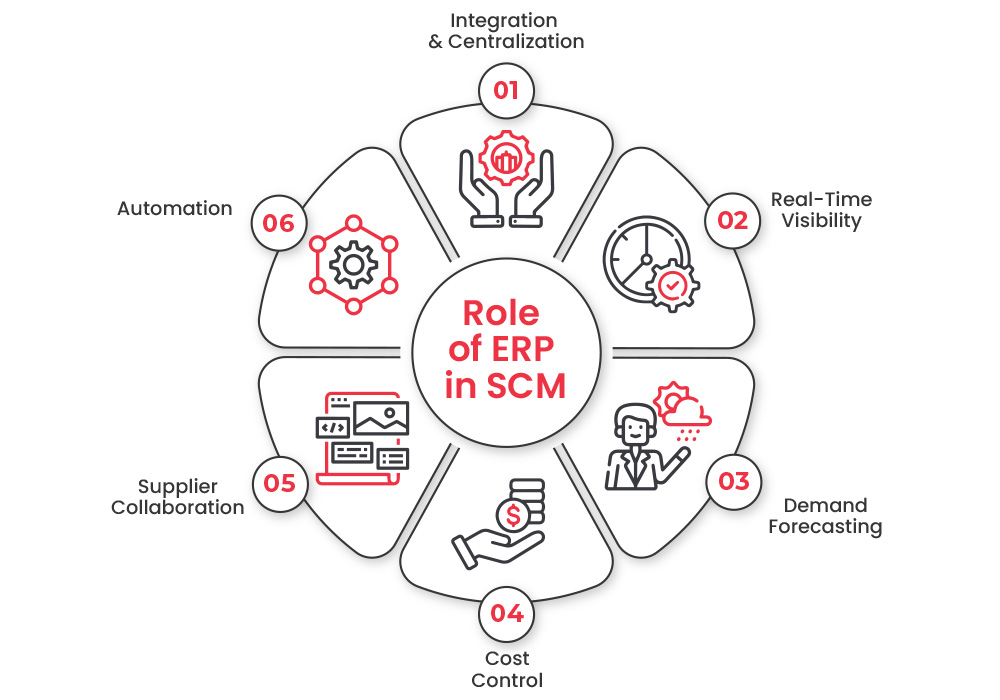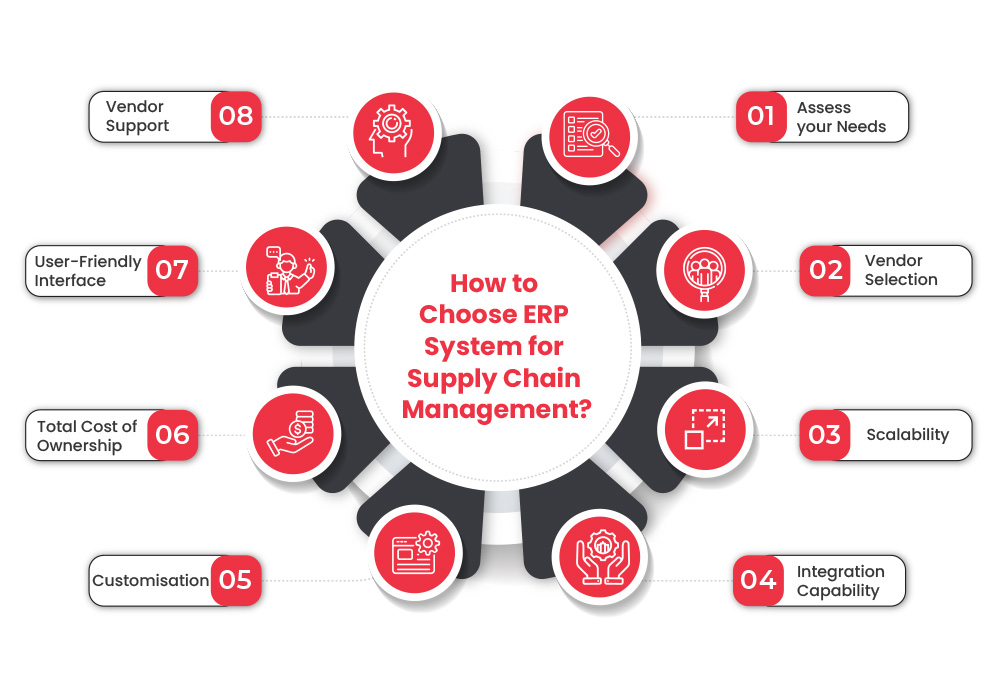Table of Content
Nowadays, supply chain business leaders are tired of using endless strategies that can empower them to grow tremendously. The competition level in the supply chain industry has reached its zenith.
So, what’s the best solution to stay ahead of the curve by outbidding the competitors? Is this question pondering quite a bit lately in your mind?
If that’s the case, this blog reading is worthwhile for you. Getting a win over your rivals is only possible when you are an expert in managing your supply chain operations. This can be achieved by embracing an ERP system for supply chain management.
In this write-up, we are unlocking insights on “How ERP software like Dynamics 365 Supply Chain Management is on hype in the market.” Besides, we’ll throw light on its role, incredible benefits, and its capabilities.
Whether you're a seasoned supply chain professional or just beginning your journey, this blog promises valuable insights into the dynamic world of ERP-driven supply chain innovation. Stay tuned with us:
Let’s get started:
What do you mean by ERP Software for Supply Chain Management?

ERP systems for supply chain management refer to a comprehensive suite of integrated software tools and modules designed to optimize and streamline the various processes involved in managing a company’s supply chain.
This software facilitates end-to-end visibility and control over supply chain operations, encompassing functions like procurement, inventory management, order processing, production planning, logistics, and distribution.
It acts as a centralized platform that empowers your team to connect all departments within an organization, as well as external partners, suppliers, and customers enabling seamless information flow collaboration.
What is the role of ERP in Supply Chain Management?

ERP software plays a pivotal role in modern supply chain management (SCM) by acting as the nerve center of an organization’s logistics and operations.
Here’s a closer look at the multifaceted role of ERP software plays in SCM:
Integration & Centralization
ERP software integrated various facets of SCM, including procurement, production, inventory management, distribution, and demand forecasting. It centralizes data, providing a single source of truth for all supply chain stakeholders, enabling better decision-making and process coordination.
Real-Time Visibility
Real-time visibility into the supply chain means that stakeholders can access up-to-the-minute data on inventory levels, order statuses, and production schedules. This kind of comprehensive visibility helps in managing demand fluctuations, reducing lead times, and enhancing overall responsiveness.
Demand Forecasting
There are various demand forecasting modules in the ERP system that predict future demand patterns by leveraging historical data and analytics. This way, organizations can maintain the right level of inventory, which further helps in meeting customer demands efficiently.
Cost Control
ERP systems aid in cost control within the supply chain by optimizing inventory levels, streamlining processes, reducing wastage, and providing real-time insights. These efficiencies lead to lower operational expenses and increased profitability.
Supplier Collaboration
Your organization team can collaborate with suppliers easily through a robust ERP system that facilitates seamless collaboration and order processing. This results in better supplier relationships, reduced procurement costs, and a more reliable supply chain.
Automation
ERP systems automate the entire supply chain process automation by integrating various supply chain functions, such as inventory management, order processing, and demand forecasting. This way, ERP-driven automation in the supply chain leads to improved productivity and cost savings.
Real-world Examples of Successful ERP Implementation in Supply Chain Management

Multiple supply chain brands like Zara, Amazon, and Walmart, rely on ERP systems for agile supply chain management.
- Zara: A Global fashion retailer, that relies on ERP systems for agile supply chain management. Their ERP software helps in tracking customer preferences and sales data in real time. This data is then used to adjust production schedules and inventory levels rapidly. Zara’s quick response to market changes has been a key factor in its success.
- Walmart: Walmart is a prime example of how ERP can revolutionize supply chain operations. They also implemented an ERP system that enables them to track inventory levels, sales trends, and customer demand in real time. This allows Walmart to optimize stock levels, reduce excess inventory, and minimize stockouts. As a result, they've improved their overall supply chain efficiency and customer satisfaction.
Similarly, there are multiple other brands that have implemented ERP solutions in their supply chains and outbidding their rivals successfully. Would you like to grow your supply chain business like these brands? If so, act now, start exploring ERP solutions, and get your hands on the right ERP solution that aligns with your business requirements.
How to Choose the Right ERP System for Supply Chain Management?

Selecting the right Enterprise Resource Planning (ERP) system for supply chain management is a critical decision that can significantly impact an organization's efficiency and competitiveness.
Here is the step-by-step approach to selecting the right ERP software for supply chain management:
- Assess your Needs: First conduct a thorough assessment of your supply chain processes. Identify pain points, areas for improvement, and specific requirements. This will serve as your blueprint for selecting the right ERP.
- Vendor Selection: Research ERP vendors that specialize in supply chain management. Look for vendors with a proven track record in your industry.
- Scalability: Ensure the ERP system can scale with your business. It should accommodate future growth without the need for a complete overhaul.
- Integration Capability: Assess the ERP’s integration capabilities with your existing systems. Compatibility is vital for seamless integration.
- Customization: Evaluate the ERP’s customization options. It should be adaptable to your unique supply chain processes without excessive complexity.
- Total Cost of Ownership (TCO): Consider the TCO, including licensing, implementation, training, and ongoing maintenance costs. Ensure it aligns with your budget.
- User-Friendly Interface: Prioritize an ERP system with a user-friendly interface as user adoption is key to success.
- Vendor Support: Assess the level of support & and training offered by the ERP vendor. Timely support can be critical during and after implementation.
Try Dynamics 365 Supply Chain Management
Dynamics 365 supply chain management stands out as a modern, comprehensive, and intelligent ERP solution that propels businesses toward supply chain excellence, making it a top choice for those seeking to stay ahead in today’s competitive landscape.
Here are some of its unique capabilities, which differentiate this from other ERP solutions available in the market.
Copilot in Dynamics 365 Supply Chain Management
It facilitates proactive disruption management by utilizing real-time intelligence from external sources, such as new modules to predict and address supply chain issues caused by weather, financial news, and geopolitical events. Copilot generates contextual email outreach through Azure OpenAI service, facilitating collaboration with suppliers, order adjustments, and distribution rerouting. This ensures timely fulfillment of high-priority customer orders, even in challenging circumstances.
Cloud-Based Flexibility
As a cloud-based solution, Dynamics 365 offers unmatched scalability and accessibility, allowing teams to collaborate seamlessly from anywhere, anytime.
IoT Integration
Dynamics 365 integrates seamlessly with IoT devices, enabling businesses to monitor assets, detect anomalies, and automate responses in real-time.
Advanced Warehouse Management
Its warehouse management capabilities optimize inventory, reduce fulfillment times, and improve order accuracy.
Related Posts - Ways to Streamline Supply Chain Management using Dynamics 365 ERP
Conclusion
To sum up this write-up, we can say that ERP or enterprise resource planning systems have emerged as a game-changer in the supply chain management industry. This blog has explored the multifaceted benefits of ERP systems in streamlining and optimizing supply chain processes.
First and foremost, ERP systems provide a unified platform that integrates various business functions, from inventory management to procurement and production scheduling. This integration eliminates data silos and fosters real-time collaboration among different departments, resulting in improved visibility and decision-making.
Furthermore, the data-driven insights offered by ERP systems for supply chain management empower organizations to forecast demand accurately, reduce excess inventory, and minimize carrying costs. Additionally, these systems enhance supplier relationships through automated communication and performance monitoring.
Ultimately, ERP systems enhance supply chain management by increasing efficiency, reducing costs, and mitigating risks. They pave the way for agile and responsive supply chains, ensuring that businesses can adapt to changing market conditions and customer demands. As the business landscape continues to evolve, embracing ERP systems is not just an option but a necessity for sustainable growth and competitiveness in the global marketplace.

Witness a scalable transformation
Experience real-time synchronisation and flexibility with a consistent view across your business.
Disclaimer– “All data and information provided on this blog is for informational purposes only. Dynamics Square / MPG Business Information Systems Pvt. Ltd. makes no representations as to accuracy, completeness, currentness, suitability, or validity of any information on this site and will not be liable for any errors, omissions, or delays in this information or any losses, injuries, or damages arising from its display or use.”













